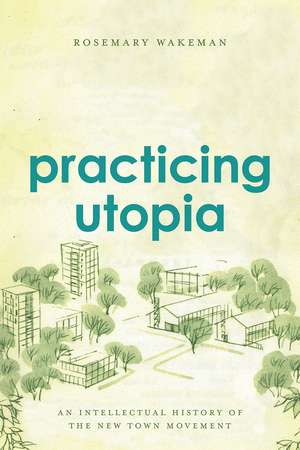Practicing Utopia: An Intellectual History of the New Town Movement
Autor Rosemary Wakemanen Limba Engleză Hardback – apr 2016
The typical town springs up around a natural resource—a river, an ocean, an exceptionally deep harbor—or in proximity to a larger, already thriving town. Not so with “new towns,” which are created by decree rather than out of necessity and are often intended to break from the tendencies of past development. New towns aren’t a new thing—ancient Phoenicians named their colonies Qart Hadasht, or New City—but these utopian developments saw a resurgence in the twentieth century.
In Practicing Utopia, Rosemary Wakeman gives us a sweeping view of the new town movement as a global phenomenon. From Tapiola in Finland to Islamabad in Pakistan, Cergy-Pontoise in France to Irvine in California, Wakeman unspools a masterly account of the golden age of new towns, exploring their utopian qualities and investigating what these towns can tell us about contemporary modernization and urban planning. She presents the new town movement as something truly global, defying a Cold War East-West dichotomy or the north-south polarization of rich and poor countries. Wherever these new towns were located, whatever their size, whether famous or forgotten, they shared a utopian lineage and conception that, in each case, reveals how residents and planners imagined their ideal urban future.
In Practicing Utopia, Rosemary Wakeman gives us a sweeping view of the new town movement as a global phenomenon. From Tapiola in Finland to Islamabad in Pakistan, Cergy-Pontoise in France to Irvine in California, Wakeman unspools a masterly account of the golden age of new towns, exploring their utopian qualities and investigating what these towns can tell us about contemporary modernization and urban planning. She presents the new town movement as something truly global, defying a Cold War East-West dichotomy or the north-south polarization of rich and poor countries. Wherever these new towns were located, whatever their size, whether famous or forgotten, they shared a utopian lineage and conception that, in each case, reveals how residents and planners imagined their ideal urban future.
Preț: 263.85 lei
Preț vechi: 306.05 lei
-14% Nou
Puncte Express: 396
Preț estimativ în valută:
50.49€ • 52.85$ • 41.78£
50.49€ • 52.85$ • 41.78£
Carte indisponibilă temporar
Doresc să fiu notificat când acest titlu va fi disponibil:
Se trimite...
Preluare comenzi: 021 569.72.76
Specificații
ISBN-13: 9780226346038
ISBN-10: 022634603X
Pagini: 392
Ilustrații: 71 halftones
Dimensiuni: 152 x 229 x 30 mm
Greutate: 0.65 kg
Ediția:1
Editura: University of Chicago Press
Colecția University of Chicago Press
ISBN-10: 022634603X
Pagini: 392
Ilustrații: 71 halftones
Dimensiuni: 152 x 229 x 30 mm
Greutate: 0.65 kg
Ediția:1
Editura: University of Chicago Press
Colecția University of Chicago Press
Notă biografică
Rosemary Wakeman is professor of history and director of the Urban Studies Program at Fordham University. She is the author of The Heroic City: Paris 1945–1958, also published by the University of Chicago Press. She lives in New York.
Cuprins
List of Illustrations
Acknowledgments
Introduction
ONE / The Origins of the New Town Movement
TWO / The Futurology of the Ordinary
THREE / Exporting Utopia
FOUR / Cybernetic Cities
FIVE / Towns of Tomorrow
SIX / Architecture for the Space Age
Conclusion: New Towns in the Twenty- First Century
Notes
Selected Bibliography
Index
Acknowledgments
Introduction
ONE / The Origins of the New Town Movement
TWO / The Futurology of the Ordinary
THREE / Exporting Utopia
FOUR / Cybernetic Cities
FIVE / Towns of Tomorrow
SIX / Architecture for the Space Age
Conclusion: New Towns in the Twenty- First Century
Notes
Selected Bibliography
Index
Recenzii
“A landmark history.”
“In her lively and nuanced account of the brief passion for ‘new towns,’ she demonstrates how two decades of town planning turned wishful thinking into pristine, uncompromising urban developments in the face of Cold War maneuvering, political instability, and vexed economics.”
“As in all good history. . .Practicing Utopia shows the resonances between past and present clearly. . . .This book is a tremendously valuable one for the student or scholar with an interest in the urban and well worth a place in the library of any institution concerned with urban studies.”
“Practicing Utopia is an ambitious and masterly historical synthesis, erudite and lucid, written in a lively and engaging style. Drawing on primary sources from around the globe as well as recent architectural and planning history, the book is an original and syncretic intellectual history of the New Town movement.”
“A must-read for anyone interested in the intellectual underpinnings of the New Towns movement. Practicing Utopia is a convincing analysis of the intellectual background of one of the twentieth century’s most influential city models. This is a fascinating, elegantly written book.”
“After the Second World War, a new town movement projected urban utopianism across the globe. Impressive in its scope and fulfilling in its details, Practicing Utopia is a fascinating survey of this moment in worldwide urban development. The impulse to begin cities anew lives and no urbanist true to the label should avoid Wakeman’s book.”
